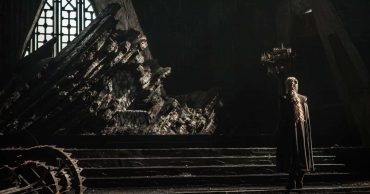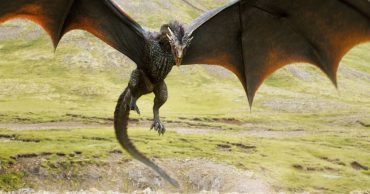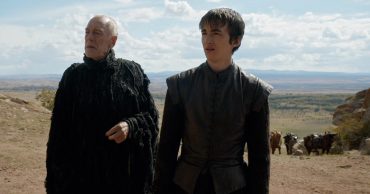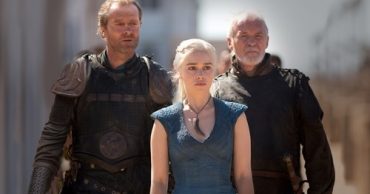
Where the Game of Thrones season premiere was focused on saying farewell to its fallen characters, “Home” is more fixated on the act of death itself – and perhaps most importantly, how death is a vessel, both as a thematic device in the world of Westeros, and as a tool for narrative progression, clearing the board for stories to advance, and new power players to emerge. In that sense, “Home” is much more fitting a season debut for Game of Thrones, one that both pauses for meaningful character moments and pushes stagnant characters into key new chapters of the GoT story.
The biggest of these, of course, is the return of Jon Snow, a resurrection Game of Thrones certainly couldn’t play as a surprising moment (as much as it may have wanted to), and instead uses to weave the many elements of the Night’s Watch together, from Davos’ show of faith to Melisandre’s utter lack of it. Their scene together is arguably the most powerful either character has hand in a long time; Davos has always commanded great dramatic presence, but his story hasn’t really been up to the task. Going to the woman he’s watched burn down Stannis’ enemies (and arguably, his empire) and asking for her help in bringing a dead man back to life is a tall task – one Davos didn’t even ask of his own son (though admittedly, he didn’t have his son’s body or the knowledge of Melisandre’s powers at the time). Seeing Davos put such faith in a woman he hates, to save a man he barely knows, is an undeniably strong moment for Game of Thrones to build on, pairing with Brienne’s second pledge to Sansa to begin building the emotional foundation of season six.
That idea of faith weaves itself both into Jon’s story, and the tales of others detailed in “Home”. The strongest of them, obviously, is Tyrion’s introduction to Dany’s two chained dragons: it’s amazing how much Peter Dinklage can do when standing alone in a room, and “Home” is a beautiful testament to his ability, a reminder of the breadth his character’s been given in the show’s leaner narrative days (if there ever was such a thing). This will, of course, seriously fuel the Tyrion Targaryen rumors that have floated around the internet for years – but it’s also a powerful moment for Tyrion’s character, another small glimmer of hope in the vast darkness that have been the last few seasons of Game of Thrones. Fittingly, that light is only provided by the fire in the dragon’s lungs and the faint flicker of Varys’ light in the background. Say what you want about the Lord of Light, but Game of Thrones is making its power felt in these early episodes, be it in Meereen’s shadows or the room Jon Snow wakes up in at episode’s end.
The rest of “Home” is a bit of a blood bath: there are occasional breaks to get a weekly update on Arya getting her ass kicked, and Tommen complains about being a bad king while Cersei’s undead “mountain” of a bodyguard smashes in a few heads. Unlike last week’s episode, however, these wheel-spinning moments are the exception, rather than the rule: by the end of the hour, Jon is alive, and both Balon Greyjoy and Roose Bolton are dead, executed by pissed off relatives ready to claim their spots on the family’s throne, and bring their influence to the war.
Now, we’ve just met Euron Greyjoy, but I’d imagine he’s going to fare better in this war than Ramsay: if Ramsay hadn’t sealed his death warrant with his torture of Sansa Stark, it’s written the moment he kills his father, and takes over what is arguably the most precariously-held position of power in Westeros. Say what you want about Tommen’s thin grasp on his own lands: Roose was a scum bag, but his ability to manage the many banners of the North while still exerting power over others with strategic moves was underrated by both the show, and the arrogant bastard son who thinks he can do a better job.
And as Game of Thrones often does, it kills most of its momentum when we watch Ramsay off his father, stepmother, and newborn infant brother (and new heir) in brutal fashion. His scenes are always the worst GoT has to offer: one note characters indulging in empty shock value disguised as “plot” and “character” have plagued these stories for years, and Ramsay’s sudden, obviously short-sighted ascent to power are no different. We’ve spent so much more time with Ramsay than Yara in recent seasons, and yet I found her brief presence in this episode more compelling than anything Ramsay’s offered in three seasons: thankfully, there’s enough good material around to drown out Ramsay’s presence, even given how important his murderous ways are to reshaping the conflicts in the North.
I would be remiss not to mention Bran’s return: but save for a cool flashback fleshing out the world of the Starks a little further, what else did he bring to the table? Sure, warging is cool as hell – but until Bran makes an actual breakthrough on his learnings with the Three-Eyed Raven, there isn’t much for Game of Thrones to do but lean on the “cool” factor of his dreams and illusions (and that weird CGI girl with the root hair – I bet her and Groot would get along real well). As much as I like to see a young, talking Hodor (how adorable was that?!), Bran’s scenes are more of a tease than anything else, lacking the emotional heft of Tyrion’s scene to really make its presence felt in what amounts to a very busy episode.
“Home” manages the juggling act of its many stories surprisingly well; in comparison with last week’s slog through funerals and threats of sexual assault, “Home” is a much more consistent episode, with a sense of direction and progression the premiere severely lacked. And now, the internet can stop talking about whether Jon Snow is coming back to life or not – that alone is enough to make “Home” an improvement over last week’s underwhelming opener.
 Follow Us
Follow Us






Visitor Rating: 5 Stars
Visitor Rating: 5 Stars